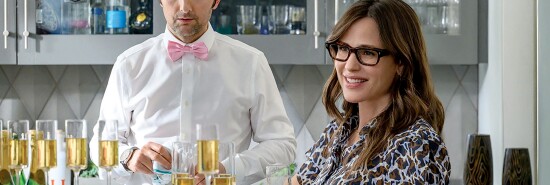
The triumphant return of Party Down
J. Oliver Conroy
Watch the original British version of The Office side by side with its more commercially successful U.S. transplant and you’ll see the bleak, cynical soul of the first transformed into something more optimistic and heartwarming. The American characters, residing in boring but cozy Scranton, get promotions, get married, move away to bigger cities. Their British counterparts remaieachn trapped in the grim brutalism of Slough. They’re probably never going to escape.
If it’s true that British humor is more comfortable with the cynical, the frustrated, the pessimistic, the mean-spirited — true that “failure is a wellspring of British comedy,” as the writer Christopher Orr argued in 2015 — then Party Down is an American comedy with a bit of the U.K. sensibility. The show’s characters are aspiring actors, screenwriters, and comics, as well as the would-be owner of an all-you-can-eat soup franchise, moonlighting at a Los Angeles catering business while waiting for their dreams to take off.
They generally don’t. The spirit of the sitcom, which premiered in 2009, is captured in a scene in the second season. A big shot film producer (J.K. Simmons), enraged at the caterers’ latest screw-up, threatens a bartender, Henry Pollard (Adam Scott, of Parks and Recreation and the superb Severance), with Hollywood’s oldest line: “You’ll never work in this town again.” Henry, a flamed-out former actor, considers his future, then says, “I know.”
Failure, fittingly, came for Party Down itself. In 2010, after two seasons haunted by low ratings, television executives delivered the inevitable coup de grace. But then something very American and underdog-y happened: Aided by a second life in Hulu reruns, the series gained a cult following. Somebody somewhere in Hollywood agreed, more than a decade later, to give it another shot.
Of course, rebooting television shows can be a dangerous business. Beloved properties come freighted with fan expectations, and reuniting older, grayer casts risks the strained, awkward atmosphere of a high school reunion or the benevolent schmaltz of a charity fundraiser. Revivals of Gilmore Girls and Arrested Development were received tepidly by critics and audiences.
So I began watching the third season of Party Down, currently airing on Starz, with caution. Thankfully my pessimism was mostly misplaced. The Party Down catering crew, with some characters gone and some new ones taking their places, is back, and they’re still as refreshingly bitter as the cocktails Henry Pollard lackadaisically slides across his bar.
Joining him for the six-episode revival are the catering crew’s tragicomic recovering alcoholic manager, Ron (Ken Marino); the embittered, incel-ish Roman (Martin Starr), a science-fiction writer whose screenplay a producer once rejected as “inert and without humanity”; Kyle (Ryan Hansen), a dimwitted actor with the untroubled good looks and enthusiasm of a golden retriever; bubbly stage mom Lydia (Megan Mullally); and Constance (Jane Lynch), a hippyish former actress who inherited an unexpected fortune at the end of the previous season.
The big absence is Casey, played by Lizzy Caplan of Mean Girls and Masters of Sex, who, we’re told, abandoned her fellow caterers for a part on Saturday Night Live. (In real life, Caplan couldn’t join the revival due to other commitments.) There are, however, two new caterers — Sackson (Tyrel Jackson Williams), a Gen Z content creator, and Lucy (Zoe Chao), a self-serious avant-garde chef — as well as Evie (Jennifer Garner), a film producer and possible love interest for Henry.
Each half-hour episode takes place during a catering function, and those have a tendency to go awry. (Seasons one and two included a Young Republicans dinner that descended into bitter factionalism, a swinger party almost foiled by the guests’ refusal to have sex, and the funeral of a respected businessman that was gatecrashed by his secret second family.) This season opens with the crew catering an event for their now-former coworker Kyle, who has thrown a party in honor of himself after finally getting his big break. Given Party Down’s ethos, you’ll know that he probably won’t stay an ex-colleague for very long.
Other events include an overly surprising surprise birthday party and a gala for “Western supremacists” — the caterers debate whether or not they’re Nazis — featuring a hilarious cameo by Nick Offerman. Hitler “gets a bad rap,” his character complains. “What if we only ever talked about the worst thing you ever did?”
A decidedly adult and gently dark comedy like Party Down needs to walk a tightrope between empathy and irony: There should be some character development, and maybe even a few moments of genuine emotion, but not enough to violate what the writers of Seinfeld used to call the “no hugs” rule. The third season mostly toes that line; if there’s a weak point, it’s the film producer, Evie. Jennifer Garner feels miscast, and her character seems shoehorned in, not quite of a piece with the others. Henry’s on-off love interest in the older seasons, Casey, made more sense: She was a fellow caterer and an aspiring comedian, and their frisson was rooted in a common experience of struggle and frustration.
Watching Party Down dragged up some fond memories from my misspent youth. I worked at a country club as, variously, a golf caddy, fry cook, janitor, and handyman. The jobs were boring and lousy but not without small consolations. We’d get sauced on company liquor and drag-race golf carts, trade gossip and dirty stories, fail, miserably, at flirting with the lifeguards, smoke cigarettes on the roof. Perhaps Party Down’s would-be cynicism has a soft underbelly: the knowledge that often the worst jobs have the best camaraderie.
J. Oliver Conroy’s writing has been published in the Guardian, New York magazine, the Spectator, the New Criterion, and other publications.
